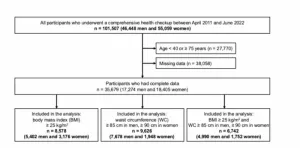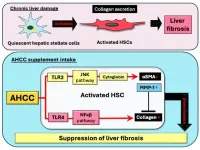(Press-News.org)
Walking speed can provide insights into health, extending beyond mere mobility, so much so that it is considered to be the “sixth vital sign.” Past studies have suggested that a slow walking speed is correlated with the development of cardiovascular diseases and an increased risk of mortality in the elderly.
A recent study led by Prof. Kojiro Ishii from Doshisha University, in collaboration with Dr. Yukio Yamamoto, Dr. Kentaro Ikeue, Dr. Kan Oishi, and Dr. Takaaki Mori from Doshisha University, Dr. Megumi Kanasaki from Takeda Hospital, and Dr. Hajime Yamakage, Dr. Noriko Satoh-Asahara, and Dr. Izuru Masuda from National Hospital Organization Kyoto Medical Center, and conducted in Kyoto, Japan explored the connection between subjective walking speed and metabolic diseases risk, particularly in individuals with obesity. The study’s findings, published in volume 14 of Scientific Reports on November 15, 2024, suggest that assessing how a person perceives their walking pace relative to peers could become a vital tool for public health.
“This study clarified that even individuals with obesity, who are at higher risk for metabolic diseases, have lower odds of hypertension, diabetes mellitus, and dyslipidemia if they report a fast subjective walking speed,” notes Prof. Ishii.
The study involved 8,578 individuals with obesity (defined by body mass index), 9,626 individuals with high waist circumference, and 6,742 meeting both criteria. The participants were asked a single question in a health questionnaire: “Is your walking speed faster than that of your age and sex?” Based on their responses, they were categorized as either “fast” or “slow” walkers. The results showed that individuals who identified as faster walkers had significantly lower risks of diabetes (30% lower) and smaller but notable reductions in the risks of hypertension and dyslipidemia.
“This questionnaire is included in a standardized protocol by the Ministry of Health, Labor and Welfare in Japan,” Dr. Ishii explains. “This allowed for a quick and easy assessment without requiring specialized equipment.”
The simplicity and accessibility of this measure makes it ideal for application in clinical and public health settings. Subjective walking speed is self-reported and readily incorporated into standard examinations unlike objective walking speed, which needs resources, time, and space to assess. This aligns with the Japanese health examination guidelines, which emphasize screening for metabolic syndrome and obesity.
The researchers attributed their findings to the relationship between walking speed and overall health. Faster walkers often demonstrate better cardiorespiratory fitness, which is associated with lower levels of inflammation and oxidative stress—two key drivers of metabolic diseases.
According to the study, individuals who walk quickly may be more fit and have a lower risk of metabolic diseases. In addition to lowering the risk of metabolic diseases, encouraging faster walking, even subjectively, could help prevent the “metabolic domino effect,” where obesity leads to lifestyle-related diseases. Obesity is the first step in this cascade, which then advances to diseases like dementia and cardiovascular disease.
Dr. Ishii emphasizes, “Promoting a faster walking pace may be a helpful individual behavior to help prevent metabolic diseases, particularly in individuals with obesity.” Despite being cross-sectional and unable to establish causation, the study’s findings align with previous research on walking pace and health outcomes. Future long-term research could validate these findings and investigate the precise processes behind the noted correlations.
Overall, the study highlights how subjective walking speed measurements could revolutionize the identification of high-risk individuals and help prevent metabolic disorders linked to obesity, especially when incorporated into routine health examinations. As it turns out, a simple question like “Is your walking speed faster than your peers?” could provide life-saving insights.
About Professor Kojiro Ishii from Doshisha University, Japan
Dr. Kojiro Ishi is a Professor in the Faculty of Health and Sports Science at Doshisha University. He holds a PhD in Physical Activity and Human Performance. His research focuses on physical activity, food for health, and health and human performance. His research emphasizes the use of physical activity to improve health, well-being, activity, and participation across the life course. His research explores the connections between city planning, sedentary behavior, physical activity, diet, and health across the lifespan. Dr. Ishii has authored 111 publications and has 1,880 citations to his credit.
Funding information
No funding was received to assist with the preparation of this study.
Media contact:
Organization for Research Initiatives & Development
Doshisha University
Kyotanabe, Kyoto 610-0394, JAPAN
E-mail:jt-ura@mail.doshisha.ac.jp
END
HOUSTON-(Dec. 18, 2024) –Houston Methodist researchers have discovered that certain components of so-called “good” cholesterol -- high-density lipoproteins (HDL) – may be associated with an increased prevalence of cardiovascular disease.
Led by Henry J. Pownall, Ph.D., professor of biochemistry in medicine at the Houston Methodist Research Institute, and Khurram Nasir, M.D., M.P.H., a cardiologist and division chief of cardiovascular prevention and wellness at Houston Methodist, the research team is using innovative methods to investigate the role of certain properties of HDL in heart health.
“During ...
Chronic liver damage can lead to hepatitis, which causes fibrosis of the liver. This buildup of collagen and other fibrous tissue accelerates when hepatic stellate cells become activated during hepatitis, often resulting in liver cancer or cirrhosis, both of which can be fatal. As there are no effective drugs to treat cirrhosis, suppressing the activation of the stellate cells is considered as a way of controlling the progression of liver fibrosis.
“It is estimated that one out of every 3-4 ...
Efficient gas separation is vital in various industries, from medical applications to energy production. However, isolating oxygen from mixtures presents a significant technological challenge. Because many gases, including argon and oxygen, share similar physical properties, separating them is difficult. Now, Ryotaro Matsuda and his team at Nagoya University have developed a unique porous metal-organic framework (MOF), which represents a novel approach to gas separation: a combined phenomenon of "adsorption" and "dissolution" that they term the "adsorptive-dissolution" ...
Physical examinations are important diagnostic tools that can reveal critical insights into a patient’s health, but complex conditions may be overlooked if a clinician lacks specialized training in that area. While previous research has investigated using large language models (LLMs) as tools to aid in providing diagnoses, their use in physical exams remains untapped. To address this gap, researchers from Mass General Brigham prompted the LLM GPT-4 to recommend physical exam instructions based on patient symptoms. ...
Inflammation in the hippocampus – the brain’s memory centre – significantly alters motivation and behaviour in mice, including food-seeking behaviour, with notable differences between males and females, a recent study reveals.
The hippocampus plays a crucial role in memory formation, learning and emotional regulation. Hippocampal neuroinflammation occurs in a range of diseases and disorders such as Alzheimer’s, Multiple Sclerosis and Depression.
People with these diseases often experience common symptoms such as apathy, difficulty with daily activities and changes to food preferences. These symptoms also tend to be more severe in women than in men.
“While ...
Almost all leading large language models or “chatbots” show signs of mild cognitive impairment in tests widely used to spot early signs of dementia, finds a study in the Christmas issue of The BMJ.
The results also show that “older” versions of chatbots, like older patients, tend to perform worse on the tests. The authors say these findings “challenge the assumption that artificial intelligence will soon replace human doctors.”
Huge advances in the field of artificial intelligence have led to a flurry of excited and fearful speculation as to whether chatbots can surpass human physicians.
Several studies have shown large ...
Surgeons are quicker and more successful at completing a buzz wire game compared with other hospital staff, finds a study in the Christmas issue of The BMJ.
However, surgeons are also more likely to swear during the task, while nurses and non-clinical staff show the highest rates of audible noises of frustration.
The researchers say their study highlights the diverse skill sets across hospital staff roles, and they suggest surgical swear jars should be considered for future fundraising events.
Within a hospital, ...
Some traditional fairy tales and classic children’s fiction that have soothed many a child to sleep may also provide accessible and engaging ways to discuss healthy sleep with children, suggest researchers in the Christmas issue of The BMJ.
Megan Thomas and colleagues analysed four popular fairy tales that include information about the benefits of sleep and the characteristics of sleep disorder.
For example, Snow White illustrates some of the daytime consequences of poor sleep due to obstructive sleep apnoea which is common in some conditions associated with short stature. These can ...
SEATTLE, Wash., Dec. 18, 2024 – New global study reports a 60% drop in global mortality from diarrheal diseases, but children and the elderly still have the highest death rates, particularly in sub-Saharan Africa and South Asia. That’s according to the latest and most comprehensive study from the Global Burden of Disease (GBD) conducted by the Institute for Health Metrics and Evaluation (IHME) and published today in The Lancet Infectious Diseases journal.
In 2021, diarrheal diseases caused 1.2 million deaths worldwide, which is a substantial drop from 2.9 million deaths recorded in 1990. The largest decrease was among children under 5 years with a 79% decline, but that age group ...
In-plane magnetic fields are responsible for inducing anomalous Hall effect in EuCd₂Sb₂ films, report researchers from the Institute of Science Tokyo. By studying how these fields change electronic structures, the team discovered a large in-plane anomalous Hall effect. These findings pave the way for new strategies for controlling electronic transport under magnetic fields, potentially advancing applications in magnetic sensors.
The Hall effect is a fundamental phenomenon in material science. It occurs when a material carrying an electric current is exposed to a magnetic field, producing a voltage perpendicular to both the current and the magnetic field. This effect has been ...




